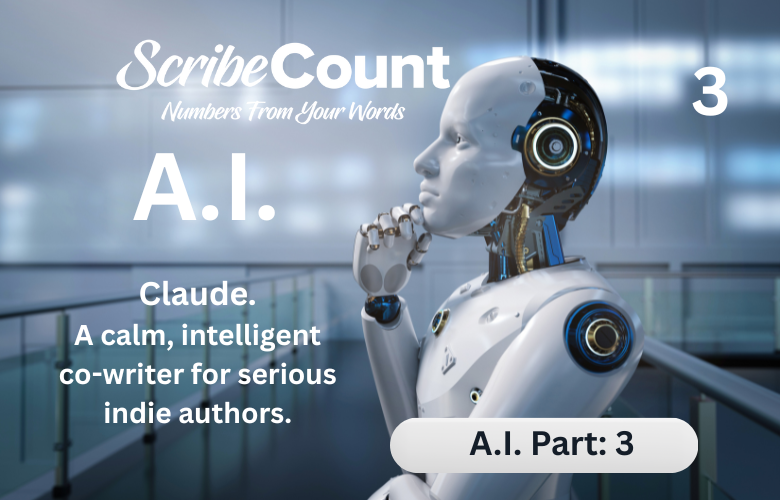Claude for Indie Authors
In the growing landscape of artificial intelligence for authors, Claude stands apart—not for flashiness, but for its subtle brilliance. Built with a unique emphasis on safety, alignment, and long-form coherence, Claude by Anthropic is quickly becoming a go-to AI assistant for indie authors who value thoughtful responses, ethical AI development, and refined control over their creative tools. Where some AI platforms prioritize marketing speed or poetic experimentation, Claude excels in collaborative thinking, narrative structure, and contextual understanding, making it a quiet powerhouse for self-publishers seeking reliable, responsive support throughout the writing journey.
This article takes a comprehensive look at Claude for indie authors, from its technical origins to its day-to-day applications. We’ll examine how it compares to other large language models, how it’s being used by writers to brainstorm, plot, research, revise, and stay focused, and what its future holds in the rapidly evolving world of generative AI.
Origins: Anthropic and the Pursuit of Constitutional AI
Claude is the flagship large language model developed by Anthropic, an AI safety and research company founded in 2021 by siblings Dario and Daniela Amodei, along with a team of former OpenAI researchers and engineers. The Amodeis had previously played leading roles in developing GPT-2 and GPT-3 but became concerned with alignment and safety issues in large-scale models. Their solution was to found Anthropic as a Public Benefit Corporation, prioritizing responsible AI development and long-term societal impact.
Anthropic’s vision for Claude was shaped by its focus on “Constitutional AI,” a technique designed to teach models ethical behavior and transparent reasoning by referencing a set of guiding principles, rather than relying solely on Reinforcement Learning from Human Feedback. This gives Claude a uniquely calm, measured tone—one that indie authors often find more humanlike and less erratic than other models.
Claude was released in early 2023, with updates to Claude 2 and Claude 3 arriving in 2024 and 2025 respectively. These versions dramatically increased the model’s context window—its ability to recall and reference earlier parts of a conversation—making it a perfect fit for long-form projects like novels, blog series, or serialized fiction. Its latest versions rival GPT-4 in reasoning, style retention, and memory, while often outperforming it in empathy and structural understanding.
What Makes Claude Unique for Writers?
Claude’s standout feature is its extensive context window. Claude 2.1 supported up to 100,000 tokens (roughly 75,000 words), and its successor has only improved. This allows indie authors to work on entire book drafts, scene outlines, or multi-layered worldbuilding documents within a single conversation. Claude remembers your characters, plot arcs, and previous decisions, allowing for in-depth collaboration across long sessions.
Its tone is another defining trait. Claude’s responses are articulate, humble, and context-aware, avoiding the sometimes erratic or overly confident output of other models. This creates a sense of co-authorship that many authors find grounding rather than distracting.
For brainstorming, Claude offers expansive responses that are thoughtful and often rich with subtext. It doesn’t simply list plot twists—it explores emotional stakes, character psychology, and genre expectations. This makes it a trusted partner in outlining, developing character arcs, or solving story problems.
In revision, Claude shines. Authors can paste large chunks of text and ask for targeted suggestions on voice, pacing, grammar, or tone. It will offer observations without overriding the writer’s voice. It can condense, reword, or expand ideas while preserving emotional intent.
Claude also serves nonfiction authors well. Its clear explanations and structured logic make it an asset for researching topics, organizing information, or creating book outlines. Its outputs read like a well-informed teaching assistant, ideal for course content, companion materials, or blog posts.
Practical Applications for Indie Authors
Indie authors are using Claude across every phase of the writing and publishing process. In early drafts, Claude assists with brainstorming scenes, generating thematic motifs, or developing multiple POVs. During the outlining stage, Claude helps organize chapters, clarify goals, and suggest narrative sequences that fit genre structure.
For in-draft support, Claude can expand short prompts into complete passages while remaining in the author’s tone. It can write summaries, loglines, or even provide dialogue variations with attention to subtext. Some authors use it to test how readers might interpret a scene, by prompting it to respond as if it were an early reviewer.
In the editing stage, Claude becomes a structural guide. It reviews character consistency, emotional pacing, and even theme resonance. While not a substitute for professional editing, it significantly reduces time spent on self-revision.
Outside the manuscript, Claude helps generate marketing copy—from Amazon blurbs and ad headlines to reader emails and book club discussion questions. Because of its narrative awareness, its blurbs often strike a better balance between intrigue and clarity than models tuned for pure marketing.
Integrations and Ecosystem Fit
Claude is accessible via Anthropic’s own web app at https://claude.ai, and also through integrations with platforms like Notion AI, Slack, and Quora’s Poe. While it does not yet offer native plugins for Vellum, Atticus, or Scrivener, authors can easily copy and paste between platforms. API access is available through Anthropic’s developer portal, allowing more tech-savvy authors to embed Claude into writing tools or personal dashboards.
Platforms like Jasper have begun incorporating Claude alongside OpenAI models for content diversification, while other creative writing platforms such as Notion and Zapier allow authors to automate workflows that include Claude-generated content.
Claude’s integration into document-based interfaces makes it particularly appealing for authors who prefer structured workspaces. With minimal formatting glitches, it plays well with Google Docs, Notion, and email platforms, making it easy to draft and deploy content without disrupting your workflow.
Pricing and Accessibility
Claude is available in both free and paid tiers. The free version offers access to Claude 3 with a modest daily usage limit, making it ideal for light users or those exploring its capabilities. The paid tier, known as Claude Pro, is priced at $20/month as of 2025 and provides priority access, higher usage caps, and more consistent uptime during high-demand periods.
For indie authors managing a modest publishing schedule, the Pro tier offers exceptional value. Compared to other AI tools with steeper price tags or usage-based billing, Claude’s flat fee and generous limits are appealing. There are no token limits to track or pricing tiers based on volume—just consistent, high-quality access to a powerful assistant.
The learning curve is also minimal. Claude’s interface is simple, conversation-based, and free of jargon. There’s no need for prompt engineering expertise. Authors can start by typing natural-language questions or requests and receive polished, genre-aware responses. The model’s clarity and respect for boundaries make it a gentle introduction to AI for even the most hesitant user.
Strengths and Limitations
Claude’s strengths lie in its empathy, coherence, and depth. It’s particularly well-suited for literary fiction, memoir, romance, and other genres where internal conflict, psychological realism, and thematic development are key. Its long memory allows for complex character arcs, and its response style makes collaboration feel natural rather than mechanical.
It also excels in nonfiction, where its ability to outline, synthesize research, and explain concepts makes it useful for authors writing guides, self-help, or thought leadership.
That said, Claude is not optimized for visual output, poetry, or highly stylized prose. It can be too formal or reserved for authors looking for punchy, experimental language. While it can mimic voice, it may require stronger prompting to do so in a lively or genre-specific way.
Its biggest limitation is that it’s not embedded in many publishing tools. Unlike Jasper or Sudowrite, which offer dozens of templates or genre-targeted presets, Claude operates entirely as a conversational assistant. This gives authors freedom—but also requires them to take the lead in shaping each session.
Final Thoughts: A Partner in Thoughtful Storytelling
Claude offers something rare in the AI world: thoughtful, calm, sustained engagement. For indie authors, especially those working on ambitious projects, long books, or emotionally resonant stories, Claude is a companion that listens well and responds with intelligence and care.
It doesn’t try to dominate the conversation. It follows your lead. And in doing so, it helps authors preserve what makes storytelling personal while expanding what’s possible in terms of speed, perspective, and depth.
Whether you’re stuck on a scene, planning your launch sequence, or mapping your next trilogy, Claude offers a welcome voice—one that supports your vision and respects your voice. It’s not just another writing tool. It’s a collaborator in the truest sense.
Learn more at https://claude.ai

